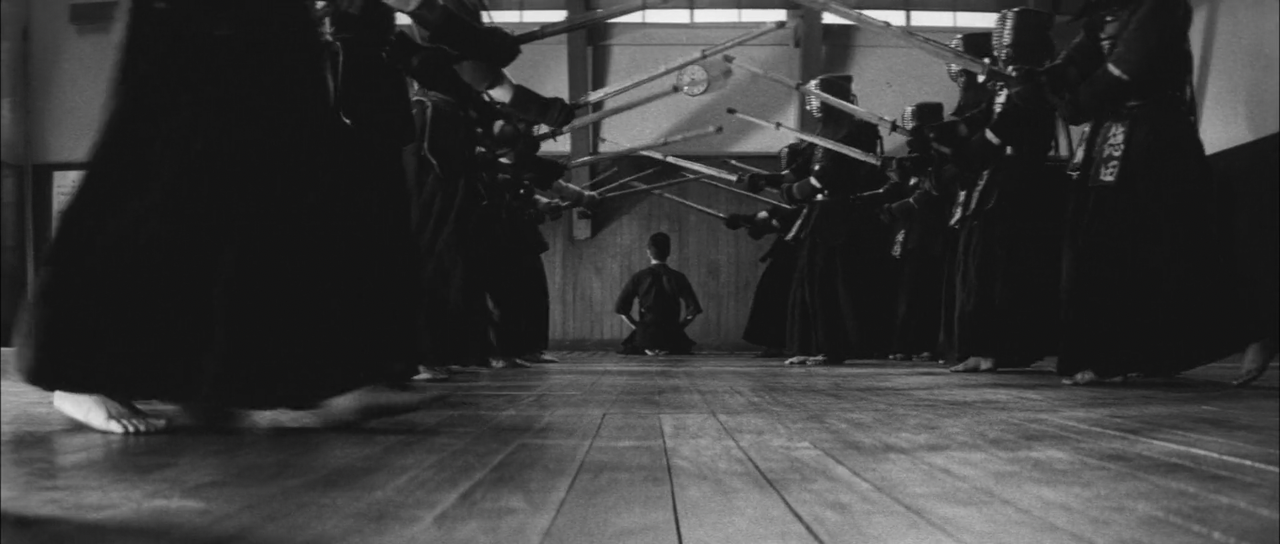黒蜥蜴 [Kurotokage / Kuro tokage / Black Lizard] (Kinji Fukasaku, 1968)
Aug
4

The Black Lizard (Akihiro Miwa) in embrace with Detective Akechi (Isao Kimura). DP: Hiroshi Dōwaki.
yukiomishima
– So what is your goal in life then? – Satisfaction of the present. The sword, and nothing else.剣 (小説) [Ken / The Sword] (Kenji Misumi, 1964)
Dec
29
Tick Tock Day

One of the kendōka kneeled on the floor in gruelling punishment faces a clock on the wall, while the other students continue their training. DP: Chikashi Makiura.
A clock face on Tick Tock Day (USA)
After World War II, the Japanese martial arts of #kendo was banished by the occupying forces in an attempt to “remove and exclude militaristic and ultra-nationalistic persons from life”. With that in mind, it makes complete sense that nationalist author and former kendo practitioner Yukio Mishima wrote a short story – Sword, originally published in literary magazine Shincho in 1963 – about the art.
Both the story and Kenji Misumi's 1964 film adaptation follow arrogant kendo student Jiro, played by sublime kabuki actor Raizō Ichikawa who also appears in an earlier Mishima adaptation, 炎上 [Enjō / The Temple of the Golden Pavilion / Conflagration] (1958).
“We come to life, we die… It's a perpetual renewal. How boring.”剣 (小説) [Ken / The Sword] (Kenji Misumi, 1964)
Dec
6
rice

Young people eating. An older woman in kimono scoops rice from an electric rice cooker. When read from right to left, this scene – as are numerous others in Chikashi Makiura's photographed 剣 (小説) – are split into tradition and modernity. DP: Chikashi Makiura.
– Mibu
憂國 [Yūkoku / Patriotism or the Rite of Love and Death] (Yukio Mishima, 1966)
May
1
Loyalty Day

Shinji Takeyama (Yukio Mishima) and Reiko (Yoshiko Tsuruoka). In a quiet framed still, Shinji lays on a tatami mat in full uniform. Reiko rests her head on his chest. Both have their eyes closed. DP: Kimio Watanabe.
Japanese author Yukio Mishima was, besides an aesthete, a fierce proponent of Japanese nationalism. In 憂國, based on his short 1960 story, Mishima plays palace guard Lt. Shinji Takeyama. Despite being one of the instigators of an ultra-nationalist coup, Takeyama decides he cannot overthrow the government as it would mean having to kill his friends and be disloyal to the Emperor. Returning home, he and his bride Reiko (Yoshiko Tsuruoka) perform #切腹 (#seppuku / #HaraKiri), as in line with Takeyama's #samurai heritage.
Yūkoku is a #SilentFilm that plays out like #Noh #theatre, with an extreme emphasis on the beauty and love of death and loyalty respectively.
After Mishima's own seppuku in 1970, his widow ordered all copies of Yūkoku to be destroyed. In 2005, in Mishima's house, a pristine copy was uncovered in a tea box.